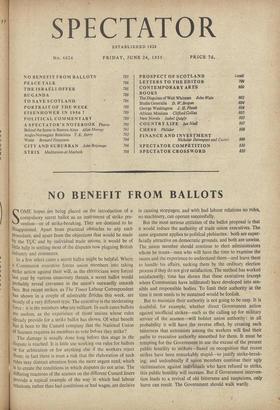NO BENEFIT FROM BALLOTS
SOME hopes are being placed on the introduction of a compulsory secret ballot as an instrument of strike pre- vention—or of strike-breaking. They are destined to be disappointed. Apart from practical obstacles to any such Procedure, and apart from the objections that would be made by the TVC and by individual trade unions, it would be of little help in settling most of the disputes now plaguing British Industry and commerce.
In a few select cases a secret ballot might be helpful. Where a Communist executive forces union members into taking Strike action against their will, as the electricians were forced last year by various unsavoury threats, a secret ballot would Probably reveal crevasses in the union's outwardly smooth face. But recent strikes, as The Times Labour Correspondent has shown in a couple of admirable Articles this week, are mostly of a very different type. The executive is the moderating force : it is the members Mao are militant. In such cases ballots are useless, as the experience of those unions whose rules already provide for a strike ballot has shown. Of what benefit has it been to the Cunard company that the National Union of Seamen requires its members to vote before they strike?
The damage is usually done long before this stage in the dispute is reached. It is little use working out rules for ballots or for arbitration or for anything else if the workers reject them; in fact there is even a risk that the elaboration of such rules may distract attention from the more urgent need, which is to create the conditions in which disputes do not arise. The differing reactions of the seamen on the different Cunard liners Provide a topical example of the way in which bad labour relations, rather than bad conditions or bad wages, are decisive in causing stoppages; and with bad labour relations no rules, no machinery, can operate successfully.
But the most serious criticism of the ballot proposal is that it would reduce the authority of trade union executives. The same argument applies to political plebiscites : both are super- ficially attractive on democratic grounds, and both are unwise. The union member should continue to elect administrators whom he trusts—men who will have the time to examine the issues and the experience to understand them—and leave them to handle his affairs, sacking them by the ordinary election process if they do not give satisfaction. The method has worked satisfactorily; time has shown that these executives (except where Communists have infiltrated) have developed into sen- sible and responsible bodies. To limit their authority at the time it most needs to be sustained would be foolish.
But to maintain their authority is not going to be easy. It is doubtful, for example, whether direct Government action against unofficial strikes—such as the calling up for military service of the seamen—will bolster union authority : in all probability it will have the reverse effect, by creating such bitterness that extremists among the workers will find their paths to executive authority smoothed for them. It must be tempting for. the Government to use the excuse of the present public hostility to strikers—based on recognition that recent strikes have been remarkably stupid—to justify strike-break- ing: and undoubtedly if union members continue their ugly victimisation against individuals who have refused to strike, this public hostility will increase. But if Government interven- tion leads to a revival of old bitterness and suspicions, only harm can result. The Government should walk warily.

















































 Previous page
Previous page